As a cat owner, you deeply appreciate the joy and companionship that your feline friend brings into your life. From graceful movements to soothing purrs, cats uniquely charm any household. However, one aspect of cat ownership can be a bit less enchanting: the dreaded litter box odor. It's a common challenge, but fear not! With the right approach, you can keep your home smelling fresh and inviting, all while ensuring your cat is happy and comfortable.
In this blog post, we'll guide you through the ultimate strategies for maintaining a litter box that not only keeps odors at bay but also promotes a healthy and stress-free environment for your beloved pet. From choosing the right type of litter to implementing effective cleaning routines, we'll cover all the bases to ensure your home remains a welcoming oasis for both you and your cat.
10 Tips To Keep Litter Box From Smelling
Choose the Right Kitty Litter
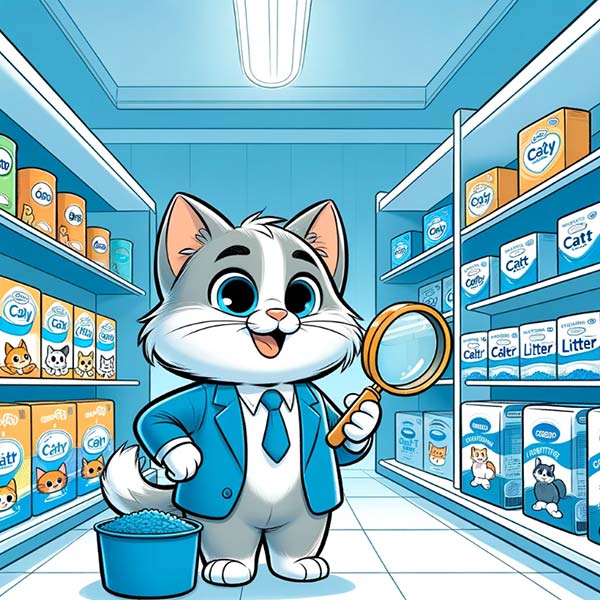
Selecting the right cat litter is pivotal in maintaining an odor-free and welcoming home for you and your feline companion. The key to an effective litter box strategy lies in choosing an absorbent clumping litter, which plays a crucial role in odor control and ease of maintenance. This type of litter quickly absorbs cat urine and forms tight clumps, effectively locking in odors and making clean-up quick and straightforward. Isolating waste in this manner maintains a fresh-smelling environment in your home and keeps the litter box clean and inviting for your cat, thereby promoting proper usage.
Opting for scented litter might seem like a good idea to mask the stinky litter box smell, but it can actually be counterproductive. Cats have sensitive noses, and the artificial fragrances in scented litters can irritate them, potentially leading to litter box aversion. This situation can result in your cat avoiding the litter box, which may cause accidents elsewhere in your home. Therefore, choosing an unscented, absorbent clumping litter is crucial for your cat's comfort and well-being, ensuring a stress-free environment for them to do business.
Regular Scooping

Maintaining a fresh and welcoming home environment, especially with a feline friend, hinges on one critical routine: regular litter box scooping. Far from being just a simple chore, daily scooping emerges as the linchpin in controlling unwanted odors, ensuring your space remains both pleasant and inviting.
The act of removing waste daily serves as an effective strategy against the accumulation of smells, preventing them from permeating your home. This process not only keeps the litter box clean and fresh but also significantly reduces the potential for odors to develop, creating an environment that is welcoming for humans and comfortable for cats alike.
Moreover, the habit of daily scooping has a dual advantage. It maintains an odor-free atmosphere while ensuring the litter box remains hygienic and appealing to your cat. This encourages regular use, which is essential in preventing issues such as litter box avoidance and inappropriate elimination around the house. Additionally, by minimizing your cat's exposure to waste and potential pathogens, you're also looking after their health and well-being.
Litter Box Washing

Maintaining a home that looks and smells welcoming, especially when sharing it with our beloved cats, requires more than just regular cleaning; it demands a focus on thoroughly washing the litter box. This crucial practice, often underestimated, plays a foundational role in litter box odor control within your living space.
Regular washing of the litter box is recommended every one to three weeks with a mild soap or detergent, which targets and eliminates lingering residues that daily scooping cannot address. If left unattended, these residues can harbor bacteria and emit persistent odors, challenging the freshness of your home environment. Choosing the right cleaning agents when washing the litter box is vital. Harsh chemicals or strongly scented cleaners can deter your cat from using the box due to the unpleasant residues they leave behind.
By opting for mild, unscented soaps, you ensure the litter box is clean and free from any additives that might affect your cat's comfort and health. This meticulous approach to litter box maintenance not only enhances the well-being of your feline friend but also plays a significant part in preserving a clean, odor-free atmosphere in your home.
Litter Box Replacement
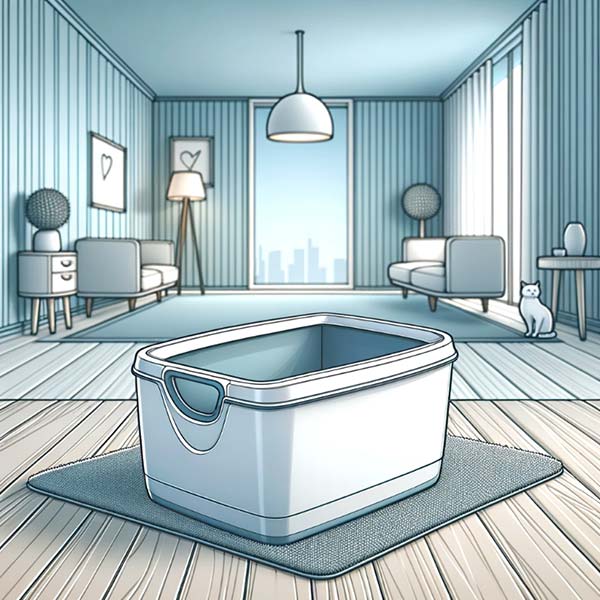
Maintaining a clean, welcoming, and odor-free home requires diligent pet care practices, among which the replacement of the litter box plays a crucial yet often overlooked role. Our feline friends' constant use of the litter box inevitably leads to wear and tear, manifesting as micro-abrasions and scratches on its surface. These seemingly minor imperfections can become breeding grounds for bacteria and odors, as residues embed within these scratches and crevices, making them difficult to cleanse thoroughly through regular washing alone.
Recognizing this, it's advised to replace the litter box annually. This practice isn't merely about cleanliness; it's a strategic move to eliminate a hidden source of lingering odors, thereby enhancing the effectiveness of overall odor control measures.
Adequate Ventilation

Ensuring your home remains welcoming and free from unpleasant odors is a top priority for cat owners, which brings to light the critical role of adequate ventilation for the litter box. Good airflow is essential in the battle against lingering smells, as it helps to dissipate odors rather than allowing them to concentrate and permeate your living space.
Selecting an optimal location for the litter box, one that benefits from ample ventilation, such as a room with windows or a breezy utility area, is key to this strategy. Closed-off spaces, like small bathrooms or closets, should be avoided due to their limited air circulation, which can trap and intensify odor problems.
The importance of a well-ventilated area for the litter box extends beyond just odor control; it also promotes a healthier environment for your cat. Adequate airflow reduces the buildup of ammonia and other potentially harmful substances that can emanate from cat waste, ensuring a safer and more inviting space for your pet. This consideration not only contributes to a fresher overall home atmosphere but also supports your cat's well-being by encouraging regular litter box use.
Add Baking Soda
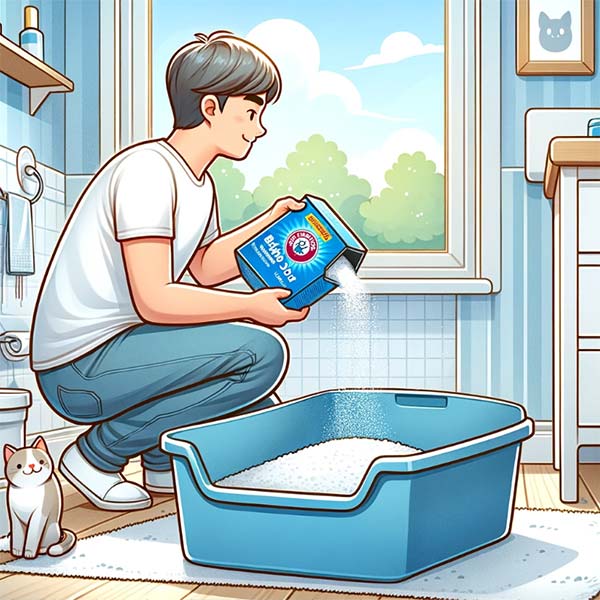
In the continuous effort to maintain a fresh and inviting home for humans and felines alike, adding baking soda to the litter box maintenance routine emerges as a simple yet highly effective strategy.
Known for its natural odor-neutralizing abilities, baking soda—when sprinkled in the litter box before adding new litter—acts as a potent deodorizer and helps absorb pet urine odors. This household staple is adept at absorbing and neutralizing the unpleasant odors that can emanate from cat waste and cat pee, offering a safe and non-toxic solution for pet owners.
Unlike commercial deodorizers containing chemicals or fragrances that could irritate or deter cats, baking soda is a fragrance-free option for combating litter box smells and poses no risk to your pet's health or comfort.
Air Purifiers and Filters
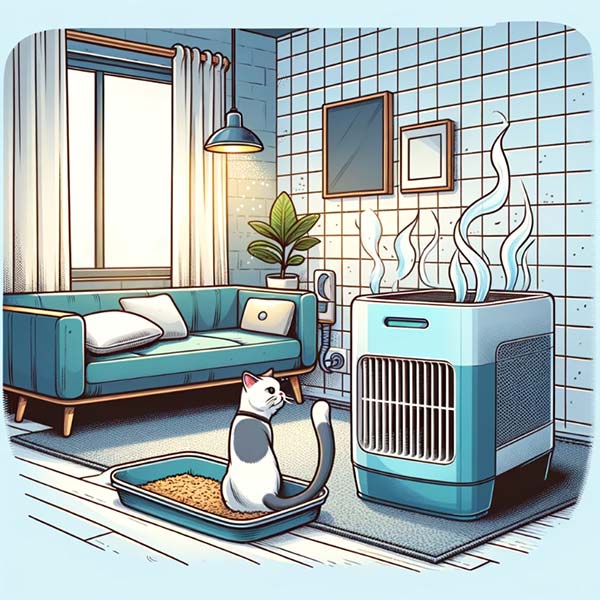
Integrating air purifiers and filters into the home is a crucial yet often overlooked strategy for cat owners aiming to combat cat's litter box odors and enhance indoor air quality.
Devices equipped with HEPA or activated charcoal filters play a pivotal role in this process, offering a comprehensive solution to unpleasant smells and airborne contaminants. HEPA filters are adept at capturing a wide array of microscopic particles, including pet dander, dust, and pollen, which helps control odors and significantly improves the overall air quality within your home. Meanwhile, charcoal filters excel in absorbing odors due to the porous nature of activated charcoal, effectively neutralizing the smells associated with litter boxes.
Furthermore, incorporating these filtration technologies into litter box covers presents an innovative and aesthetically pleasing approach to odor management. Covers fitted with charcoal filters can considerably mitigate the escape of odors, ensuring a cleaner and fresher environment. Integrating air purification directly at the source of odors offers a discreet solution to maintaining the litter box, contributing to a more inviting living space.
Proper Box Sizing and Quantity

Maintaining a fresh and odor-free home for cat owners requires thoughtful consideration of the litter boxes used, specifically their sizing and quantity. A properly sized litter box is essential for ensuring your cat's comfort and willingness to use it.
If a litter box is too small, it may deter a cat from using it, leading to unpleasant odors in the home. Larger litter boxes allow for a more even distribution of waste and litter, significantly aiding odor control and preventing waste from being scattered outside the box.
Furthermore, the importance of having multiple litter boxes in a multi-cat household cannot be overstated. The general guideline recommends having one more litter box than the number of cats, ensuring each cat has access to a clean space. So, if you have one cat, two litter boxes should be available. This strategy mitigates stress among cats over territorial issues and plays a crucial role in controlling odors. With each cat having their own clean spot, the likelihood of any one cat box being overused and becoming a source of strong odors is greatly reduced.
Changing Your Cat's Diet

What goes into your cat has a direct impact on what comes out. High-quality cat foods are designed not only to meet your cat's nutritional needs but also to ensure that waste is more compact, less smelly, and easier to manage. These diets typically contain higher levels of digestible proteins, which means your cat's body can use more of what it consumes, leaving less waste behind. On the other hand, cat foods filled with fillers and lower-quality ingredients can result in bulkier, smellier waste because they pass through the cat's digestive system less efficiently.
Install reverse window fan
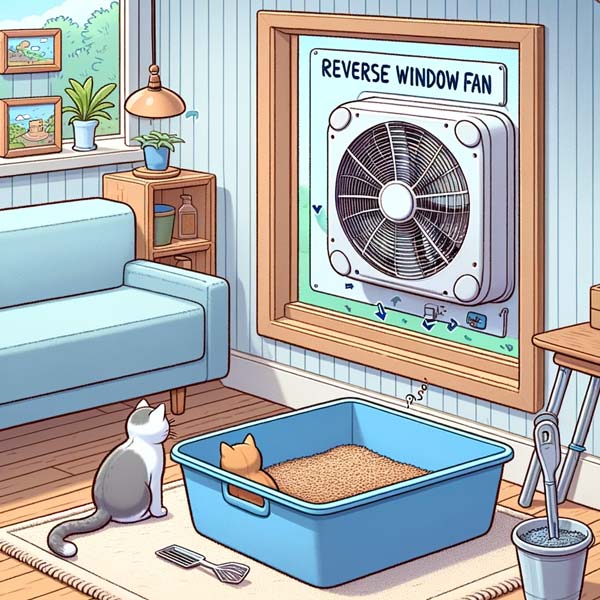
A reverse window fan operates by drawing air from inside your home and expelling it outdoors. The directional airflow plays a crucial role in combating litter box odors. By strategically placing a reverse window fan near the litter box area, you can directly capture and remove odors at their source before they have a chance to spread throughout your home. This proactive ventilation method ensures that smells are not just diluted or masked but are actively eliminated, keeping the air in your living space fresh and clean.
Installing a reverse window fan is a straightforward process that yields significant benefits for odor management. Unlike more complex air purification systems, a window fan is easy to install, operate, and maintain, making it an accessible option for many cat owners. Its operation is unobtrusive, and with modern, energy-efficient models, the impact on your electricity bill can be minimal. This makes the reverse window fan a practical and cost-effective solution for enhancing the air quality of your home.
